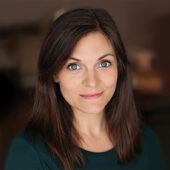
Karen Mead
Facilities & Building Services Manager
Karen looks after the OII's buildings and the people inside them. She manages all three sites, oversees health and safety in the department, and works as part of the HR team.
Charlotte Smart was a member of our 2014-15 MSc group. She studied geography as an undergraduate at Oxford, where she looked at the impact of technology adoption amongst the Maasai in Kenya. She now works for the UK Department for International Development (DfID).
Interview with Karen Mead.
Karen: What first attracted you to the OII? And what were you doing before?
Charlotte: For me the OII was a real chance to specialise – I knew that I wanted to work in technology and international development and the course allowed me to get both an academic and practical grounding in these subjects. It was a great chance to push my understanding by meeting people who come from all walks of life and get my hands dirty doing things I would never have tried on my own – like coding and exploring the dark web.
I arrived at the OII fresh from living in India where I’d been working on the implementation of digital payments to citizens (for example for pensions, or food allowances) on behalf of the Indian Government. Before that I’d studied geography as an undergraduate at Oxford where I’d looked at the impact of technology adoption amongst the Maasai in Kenya
Karen: And what have you been up to since leaving the OII?
Charlotte: I now work at the UK Department for International Development. After joining on a one-year graduate trainee scheme, I now have a permanent role and I advise on their digital work. I’ve worked on a range of topics – from developing a digital strategy to increasing internet access in Africa.
The job is interesting and can be very varied, taking me to Kenya several times and the US. My role often brings in specialist knowledge of the digital to help think how we can use technology in our development programming – for instance, using digital cash transfers to get allowances to refugees or crowdsourced data to better respond to humanitarian emergencies and working with entrepreneurs in tech hubs in Nairobi. It’s not alI technology though. I even had a role ironing national flags at an International Summit on Syria attended by David Cameron, Angela Merkel and other world leaders!
Karen: What job-seeking advice do you have for our students?
Charlotte: A little told secret is that so many organisations know very little about the internet and technology and are keen to learn more! So students specialising in this are in a good position win job offers! Once I had my masters I was also offered a role at one of the Big Four in cyber security and a post in a specialist digital consultancy.
I was able to make my time at the OII practical – I combined my research with work for a digital consultancy, and eventually was able to publish a paper from my MSc thesis. Being able to show not only that I had a grounding in the issues, but could apply them in a practical way went a long way in helping me get a job.
Karen: What do you miss most about Oxford?
Charlotte: Oxford is full of a wide range of people and diverse perspectives from the OII and beyond. That is what I miss most. In my cohort we tried to launch a startup crowdsourcing solutions to social action problems. We drew on the experience of people with completely different backgrounds and even some of the OII tutors. I’d never have been able to work with such a diverse set of people to lead something like that anywhere else.
Karen: And finally: where do you see yourself in five years?
Charlotte: I’m keen to spend more time on the ground seeing the implementation of digital projects especially in developing countries and to work more on research topics and issues. This probably means there will quite a few stays outside the UK on horizon – and hopefully the chance to work with lots of like-minded people from across the world.
Note: This post gives the views of the author(s), and not necessarily the position of the Oxford Internet Institute.